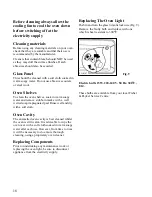
16
The times quoted above are given as a guide and should be adjusted to suit personal taste.
THINGS TO NOTE
The oven indicator neon will glow until the oven has
reached the desired temperature and then go OFF. It will
then cycle ON and OFF showing that the oven
temperature is being maintained.
The indicator windows for selector and oven
temperature control will illuminate.
The oven fan and internal oven light will come on.
The control cooling fan will operate after a short
time. It will run on after the controls are switched
off until the appliance has cooled.
HINTS AND TIPS
Prepare foods in the same way as for conventional
grilling. Brush lean meats and fish lightly with a
little oil or butter to keep them moist during
cooking.
Most foods should be placed on the grill pan grid in
the 'high' position in the grill pan to allow maximum
circulation of air around the food. Food such as fish,
liver and kidneys may be placed directly onto the
trivet in the grill pan, if preferred.
The use of the trivet beneath the grid when grilling
fatty foods will help minimise splashing.
Accompaniments such as tomatoes and mushrooms
may be placed below the grid when grilling meat,
or in a separate dish on a lower shelf.
Foods will cook more quickly the closer they are to
the grill element and the higher the temperatures
selected. Be prepared to adjust temperature and
shelf positions during cooking, if necessary.
Turn food over during cooking, as necessary.
Ensure that ready prepared or cooked chilled dishes,
e.g. shepherds pie, moussaka, lasagne, etc., are
piping hot throughout before serving.
A temperature range of 140-200
°
c and shelf
positions 3 and 4 are suitable for most foods. Be
prepared to make adjustments during cooking to suit
individual requirements. If thermal grilling on more
than one level, it may be necessary to interchange
the food on the shelves during cooking.
COOKING TIMES - Cooking is more gentle,
therefore food generally takes a little longer to cook
with thermal grilling compared with conventional
grilling. One of the advantages is that larger loads
can be cooked at the same time.
A general guide to cooking times is given below but
these times may vary slightly depending on the
thickness and quantity of food being cooked.
FOOD
SHELF
TEMP.
TIME
(
°
C)
Bacon Rashers
3
200
8-12
Beefburgers
3
190
10-15
Chicken Joints
3
160
35-45
Chops
- Lamb
3
170
20-25
- Pork
3
170
25-35
Fish
- Whole Trout
3
170
10-20
- Mackerel
3
170
10-20
Fillets
- Plaice/Cod
4
170
10-15
Kebabs
4
170
20-30
Kidneys
- Lamb/Pig
3
180
10-15
Liver
- Lamb/Pig
3
180
20-30
Sausages
3
190
10-15
Steaks
- Medium
3
200
8-10
each side
Steaks
- Well Done
3
200
10-12
each side
Heating through and
Browning, e.g. au-gratin,
3
170
20-30
lasagne, shepherds pie.
depends on size




































